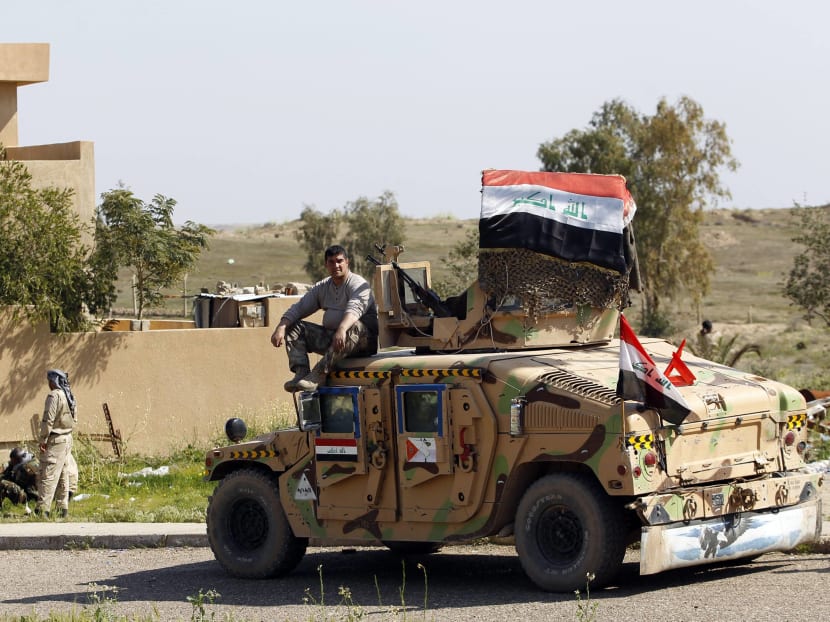Iraq’s Tikrit: A Sunni bastion on the road to Mosul
BAGHDAD — The offensive launched today (March 2) by Iraqi troops backed by Shiite militias and Sunni tribal fighters is aimed at capturing Tikrit, a Sunni city 130km north of Baghdad that was captured by Islamic State militants during their lightning advance last summer.

An Iraqi soldier sits on a military vehicle at Udhaim dam, north of Baghdad on March 1, 2015. Photo: Reuters
BAGHDAD — The offensive launched today (March 2) by Iraqi troops backed by Shiite militias and Sunni tribal fighters is aimed at capturing Tikrit, a Sunni city 130km north of Baghdad that was captured by Islamic State militants during their lightning advance last summer.
The hometown of Saddam Hussein, Tikrit is on the main highway from Baghdad to Mosul, Iraq’s second largest city, which is also held by the Islamic State. Retaking Tikrit would be the biggest victory yet for Iraqi forces battling the Islamic State group, but the entry of thousands of Shiite militiamen into the Sunni city could aggravate tensions and severely test the government’s ability to suture the country’s sectarian wounds.
Here are a few quick facts about Tikrit.
STRATEGIC LOCATION: Tikrit is at the intersection of the main highway leading from Baghdad to Mosul and another key road to the northern oil hub of Kirkuk. Iraqi forces halted the Islamic State advance outside the town of Samarra to the south of Tikrit last summer and recaptured the Beiji oil refinery town to the north in November, allowing it to potentially attack from two sides. Capturing Tikrit would further secure the vital north-south supply route ahead of an attempt to retake Mosul, which US officials have said could come as soon as April.
SYMBOLIC VALUE: Tikrit is the hometown of Saddam Hussein, whose Sunni-dominated dictatorship ruled Iraq for more than two decades before it was toppled by the 2003 US-led invasion. Since then the Sunni minority has felt increasingly marginalised by the Shiite majority and the Shiite-led government in Baghdad, and in 2006 long-running tensions boiled over into sectarian violence that claimed tens of thousands of lives.
The Islamic State was able to rally Sunni support by portraying its advance as a “revolution” against the Shiite-led government and security forces, and Tikrit fell in a matter of days last June as the security forces crumbled. The army today is backed by tens of thousands of Iranian-backed Shiite militiamen, who have proven effective in the battlefield but have been accused by rights groups of terrorising Sunni civilians.
The brutality displayed by the Islamic State group far exceeds that of the Shiite fighters. It was in Tikrit where Islamic State extremists massacred hundreds of captured Iraqi soldiers last summer, later publishing pictures of the mass killing online. But it’s unclear whether Iraqis in the country’s Sunni heartland see the Shiite-led government as a better alternative.
PROSPECTS FOR SUCCESS: The Iraqi army can approach Tikrit from the north and south, and still controls a massive army base on the town’s outskirts known as Camp Speicher by the American troops who were once stationed there. But a number of attempts to retake the city last summer failed, and it’s not clear to what extent Prime Minister Haider al-Abadi has rooted out corruption and incompetence in the security forces.
Even if they drive out the Islamic State militants, the Iraqi army and its Shiite allies are unlikely to be able to secure Tikrit without the support of powerful Sunni tribes, many of which deeply distrust the government. Iraqi state TV says Sunni fighters are taking part in the offensive, and Prime Minister Haider al-Abadi has promised amnesty for tribal fighters who break with the extremists, calling it their “last chance” to ally with the government. Just how many have heeded that call is not yet known.
LONG ROAD TO MOSUL: Capturing Tikrit would mark a major victory for the Iraqi army and the US-led coalition that has been carrying out air-strikes against the Islamic State group since last August. But the road to Mosul extends another 250km to the north, and the Islamic State group still controls much of the vast Anbar province to the west. Any pro-government forces stationed in Tikrit would likely be targeted by suicide bombings and other attacks, and securing the city could divert much-needed forces from any eventual push toward Mosul. AP






